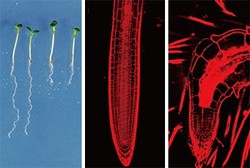A newly identified family of peptide hormones plays a crucial role in post-embryonic plant root growth

Fig. 1: Arabidopsis mutants lacking the enzyme TPST have much shorter roots compared to wild-type plants (left). Confocal microscopy images (center, right) show the root meristems of wild-type (center) and mutant (right) plants five days after germination.
Left panel from Ref. 1. Reproduced with permission. c 2010 AAAS
Researchers at Nagoya University1 have discovered a family of peptide hormones needed for root growth in Arabidopsis thaliana, a small flowering plant related to cabbage and mustard that has been adopted by biologists as a model species for studying plant development.
Plant cells often communicate with each other using secreted peptide hormones to coordinate their activities. Some of these peptides are chemically modified by enzymes such as tyrosylprotein sulfotransferase (TPST), which transfers sulfate to the amino acid tyrosine.
"When we identified TPST in Arabidopsis in 2009, we were surprised to find that the Arabidopsis mutant lacking TPST has abnormally short roots. This impressive phenotype implies that tyrosine-sulfated peptide hormones are critical in root development," says lead researcher Yoshikatsu Matsubayashi from the GCOE for Advanced Systems Biology.
The researchers began searching for novel tyrosine-sulfated peptide hormones by analyzing Arabidopsis mutants lacking TPST (Fig. 1).
They found that activity in the root meristem -- a region containing undifferentiated cells where growth can take place -- was much reduced in the mutants compared with normal plants, and that root stem cells were not properly maintained. The problems seemed to be specific to post-embryonic root development because embryos appeared normal. Moreover, the distribution of the plant hormone auxin, an important hormone regulating root development, was also normal, suggesting that the cause of the disruption of root meristem activity lay elsewhere.
The growth problems remained even when the researchers added PSK and PSY1, two previously identified tyrosine-sulfated peptide hormones. This led the team to suspect that at least one previously undiscovered tyrosine-sulfated peptide hormone might be required.
A search of the Arabidopsis genome revealed a candidate gene family that encodes small tyrosine-sulfated peptides. The researchers conducted experiments using a synthetic version of one of these peptides and demonstrated its importance for stem-cell maintenance and root meristem activity.
"Because of its ability to promote post-embryonic root growth, we have named the peptide 'root meristem growth factor 1', or RGF1," explains Matsubayashi.
Further analysis showed that RGF1 and other members of the RGF family are expressed mainly in the root stem-cell area and in 'columella' cells in the middle of the developing root, and that they function as secreted peptide hormones. What's more, RGF1 regulates expression and distribution of the transcription factor PLETHORA, a master regulator of gene expression in root stem cells.
"We now wish to understand how individual root cells process and integrate information provided by RGFs and auxin to direct root growth and morphology," says Matsubayashi.
Affiliated Researchers
The Nagoya University affiliated authors mentioned in this highlight are from the Advanced Systems Biology: Designing the Biological Function GCOE program of the Graduate School of Bio-Agricultural Sciences.
Reference
- Matsuzaki, Y., Ogawa-Ohnishi, M., Mori, A. & Matsubayashi, Y. Secreted peptide signals required for maintenance of root stem cell niche in Arabidopsis. Science 329, 1065 (2010). | article